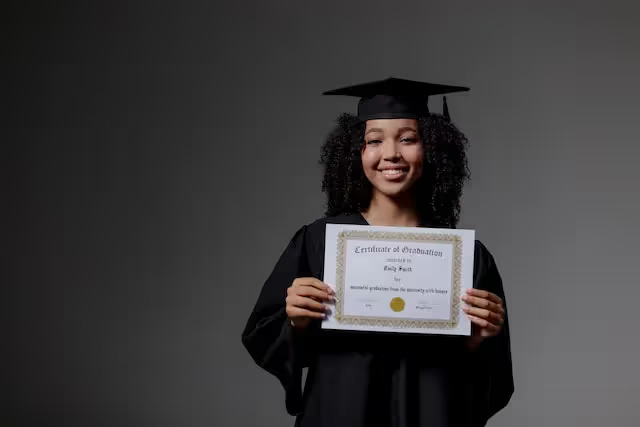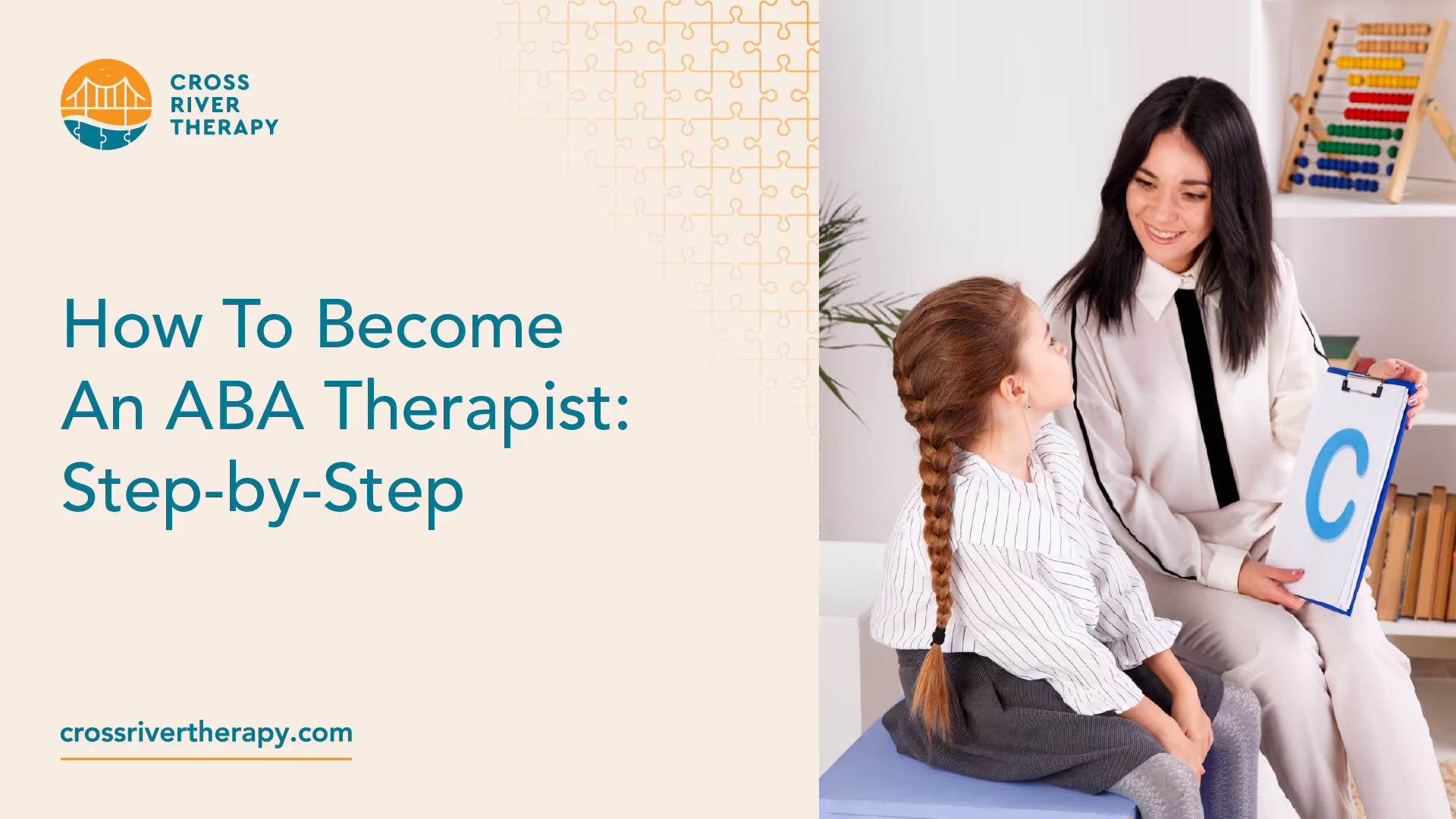How To Become An ABA Therapist: Step-by-Step
Learn how to become a certified ABA therapist, step-by-step.

Becoming an ABA Therapist
- Step #1: Earn an Undergraduate Degree
- Step #2: Earn a Graduate Degree
- Step #3: Work on Licensure and Certification

Step 1: Earn an Undergraduate Degree
The starting point for ABA is for a college student to first earn a Bachelor's degree, though it doesn't have to be a specific major at this level.
Regardless, a psychology major can help since much of its coursework focuses on the fundamentals of therapy in general.
It's also attached closely to ABA therapy.
Some psychology majors may devote their studies to ABA on their own. In psychology, students will learn about multiple disorders, one being autism. Another major that looks well on the resume of a hopeful ABA therapist is sociology.
Step 2: Earn a Graduate Degree
As previously mentioned, most BCBAs have Master's degrees, earned after a student's graduate degree program. They operate independently, practicing behavior analysis with people in different settings, not just in an ABA clinic. Here's what's needed to become a BCBA:
- A Master's degree or Doctorate is required. The place where the degree is obtained must be accredited with the BACB, or Behavior Analyst Certification Board.
- Coursework on behavior analysis is needed within the degree program. It's often set up as an internship.
- Firsthand experience with a supervisor conducting behavioral therapy. The number of hours needed can change from place to place.
- The certification test for the BCBA must be passed.
- A behavioral analysis degree, such as one in education or psychology. It must meet the qualification standards of the BCBA. To avoid confusion, students can have their degree program looked at by the BCBA before the certification is applied.
After the graduate degree is earned, the next phase is to get supervised experience in therapy sessions. This is overseen by the BCBA. Fieldwork must total at least 1,500 hours. Another 1,000 hours of practicum and intensive practicum are necessary, which must reach 750 hours.
The hours they're supervised are between 20 and 130 hours at its cap.
Of the supervisory hours, they occur within a single month.
After all, requirements are met regarding eligibility, students may begin their application for certification. The entire application can be filled out and sent to the board over the internet. There is a one-time cost involved.
The application fee is $245. When finalized, all documentation is stored on an account with the BACB's website. After approval, students can fill out a registration form to take the BCBA test. It's $125. Every test is conducted with Pearson Vue, which operates exam centers in every state.
Once the exam is passed, trainees become immediate behavioral analysts by proof of certification. For study and preparation for the exam, students can find a plethora of resources on the internet and in many schools.
If you're an aspiring ABA therapist, you might be on the lookout for the best ABA therapy jobs. Introducing ABATherapistJobs.com, the first job board for ABA therapists to find high-paying ABA therapist jobs.
Step 3: Work on Licensure and Certification
To emphasize, an ABA therapist must obtain certifications through the BACB. Anyone with plans to become a behavioral analyst is required to finish one or more of these stipulations:
- Applicants need a graduate degree and work as a member of their school body's faculty
- Earn a graduate degree and have many hours of work experience on the job, such as in an ABA clinic
- Possess a Doctorate with 10 years of behavioral therapy experience
Applications are done online or directly with the BACBs through a package sent to their mailing address.
If the BACB has proof that one or more of the requirements shown above are met, eligibility for the exam is provided. It consists of 160 questions, more of them multiple choice.
Of those, 150 are evaluated. 114 questions must be correct for students to pass the exam. They're provided four hours to complete it.
What's Needed to Become an ABA Therapist
Studying for a career as a behavioral therapist will allow students to gain a foothold in many jobs that are related to the field.
Whatever one's prior profession or background might be, learning all the requirements needed to advance to the position of an ABA therapist guarantees success in the field.
The position is a well-known career with plenty of reputable figures that are known in the medical field. But like any job, it mandates an extensive understanding through lots of study and schooling.
Use the following information to gain insight into what's required to become employed as a behavioral therapist. The specifics about a BCBA and its related positions are noted, including the different skills needed for one to work in an ABA clinic.
BCBAs and BCBA-Ds
What's the difference between a BCBA and a BCBA-D? The former is a board-certified behavior analyst.
These are the therapists that visit the homes of patients, work in schools, and have therapy sessions at hospitals. They strive to reduce severe symptoms of autism, things such as tantrums and self-harm.
To do this, they must look for what causes the behavior to happen in the first place.
A BCBA-D is called a board-certified behavior analyst as well, though one that has a Ph.D. Yet BCBAs have Master's degrees. In most ABA clinics, hospitals, and schools, a BCBA-D carries out similar duties as a BCBA.
They abide by the same standards, especially when working independently. Nevertheless, BCBA-Ds have more opportunities to take part in research studies involving ABA and even work as professors at universities and colleges.
Frequently Asked Questions
1. Is becoming an ABA therapist hard?
Studying to become an ABA therapist has specific requirements, many of which can only be done through attendance at an institution of higher education.
Therefore, learning what's needed to later become one has its challenges. Like all subjects in school, it requires lots of study and dedication to finish a student's degree program.
Within the program, certifications are needed, most of them behind paywalls. However, as students progress in their knowledge of psychology, the fundamentals of ABA therapy become easier to understand. ABA is a rewarding subject where practitioners are taught to appreciate challenges head on.
2. Is being an ABA therapist hard?
An ABA therapist has difficulties, most usually from having to treat different children while maintaining a working relationship with parents.
In a school setting, being a behavioral therapist could be more challenging, as schools are often places where children with autism exhibit lots of distressing symptoms.
But for most, the job descriptions of a typical therapist are relaxed, with most time spent doing observations and creating therapy sessions.
Therapists will gather what's observed by the patient, their family, caretakers, and teachers. They also set up interventions with patients by using the information gathered from their initial time spent with the patient and their families.
3. How do you train to become an ABA therapist?
After a degree is earned and work begins, ABA therapists will continue training. Some therapists straight out of college may continue with an internship.
It's primarily done through networking and certifications. The therapists usually have friends and acquaintances in the field that they can refer to and communicate with.
At the doctorate level, they may even conduct training or testing, taking part in peer-reviewed journals.
Training by certification is done by nearly everyone that works in the ABA field. It's necessary since the practice is constantly updated with new ways of conducting therapy for patients.
As such, many certifications must be updated for the people that work under a BCBA, to which the BCBA can gain additional knowledge on themselves.
4. Is becoming an ABA therapist worth it?
ABA therapy is a worthwhile career choice for anyone that has the criteria to do it. Many BCBAs love their job and the people and patients they meet throughout their careers.
Salary-wise, therapists earn good wages, though pay can be higher or lower than the average. This is specified at a little over $100,000. As therapists progress, they can make significantly more than the average, particularly those with a good reputation in the field.
What’s the definition of an ABA Therapist?
Before one can start their journey into a career, it's meaning and duties must be understood. ABA is short for applied behavior analysis.
It's an area of study that helps out people diagnosed with autism spectrum disorder. ABA allows them to learn rudimentary but necessary skills and different ideas to assist in their social abilities.
The majority of an ABA therapist's duties consist of getting children to talk to people better, whether they be peers, adults, other family members, or random people they come across.
But ABA therapists are also of great assistance to other disorders, including ASD and even PTSD.
People that have had brain trauma or other head injuries have taken ABA sessions with great improvements in their communicative skills.
Any developmental disorder can potentially be mitigated through ABA therapy. The primary objective of a behavioral technician is to find and study the behavior of the patients they see on an individual basis.
These behaviors can manifest under varied situations and environments. Once the therapist finds out how these situations impact the behavior of the client they study, the sources making them occur are detected.
From there, more work is done to set up therapy sessions to counter unwanted behavior. Here's what an ABA therapist typically does during their workweek:
- Evaluating and studying patient behavior for eventual rehabilitation
- One on one conversations with all patients
- Additional communication with clients, their families, and anyone else that spends time with patients being provided ABA therapy
- Lots of administrative duties, filing records and maintaining them as they're needed
References
- https://online.regiscollege.edu/online-masters-degrees/master-science-applied-behavior-analysis/resources/how-to-become-an-applied-behavior-analyst-aba-therapist/
- https://www.apexaba.com/blog/how-to-become-an-aba-therapist
- https://www.appliedbehavioranalysisedu.org/how-to-become-aba-therapist/
- https://www.indeed.com/career-advice/career-development/how-to-become-aba-therapist
- https://www.abtaba.com/blog/aba-therapy
Recent News
Related articles

Working With Autistic Children: 10 Career Options
Want to work with autistic children? Here are 10 career options for you to consider.

What Is The Age Limit For ABA Therapy In Indiana?
Find out what the age limit is for receiving Applied Behavior Analysis (ABA) therapy in Indiana.

What Is The Age Limit For ABA Therapy In Arizona?
Find out what the age limit is for receiving Applied Behavior Analysis (ABA) therapy in Arizona.

Verbal Operants In ABA: Definition & Examples
In Applied Behavior Analysis, verbal operants are a type of verbal behavior.

Token Economy: Examples & Applications in ABA
A token economy is a procedure that was developed to help reduce maladaptive behaviors and increased desire behaviors by providing a tangible conditioned reinforcer.

Trigger Analysis In ABA: Definition & Examples
Trigger analysis is a segment of ABA therapy where children are taught by therapists to pinpoint the behaviors and emotions that happen before, during, and after an event that takes place.

Variable Ratio Schedule & Examples
A variable-ratio schedule is a random reinforcement where responses are reinforced following varied responses afterward.

Task Analysis In ABA Therapy: Examples & Strategies
Task analysis is a process of teaching that divides complicated activities into sections involving easier steps for students to more easily take.

Stimulus Equivalence In ABA: Definition & Examples
Stimulus equivalence shows how relationships can manifest among different types of stimuli in different situations.

Speech Therapy For Autism: ABA vs. Speech Therapy
ABA therapy can help individuals with speech impairments learn to better identify and utilize the language skills they already have.

Stimulus Control Transfer ABA: Definition & Examples
Stimulus control is defined as an expression used to detail circumstances where a behavior is triggered by the existence or absence of a stimulus.

Social Validity In ABA: Definition & Examples
Social validity is the acceptance of interventions concerning behavioral changes.

